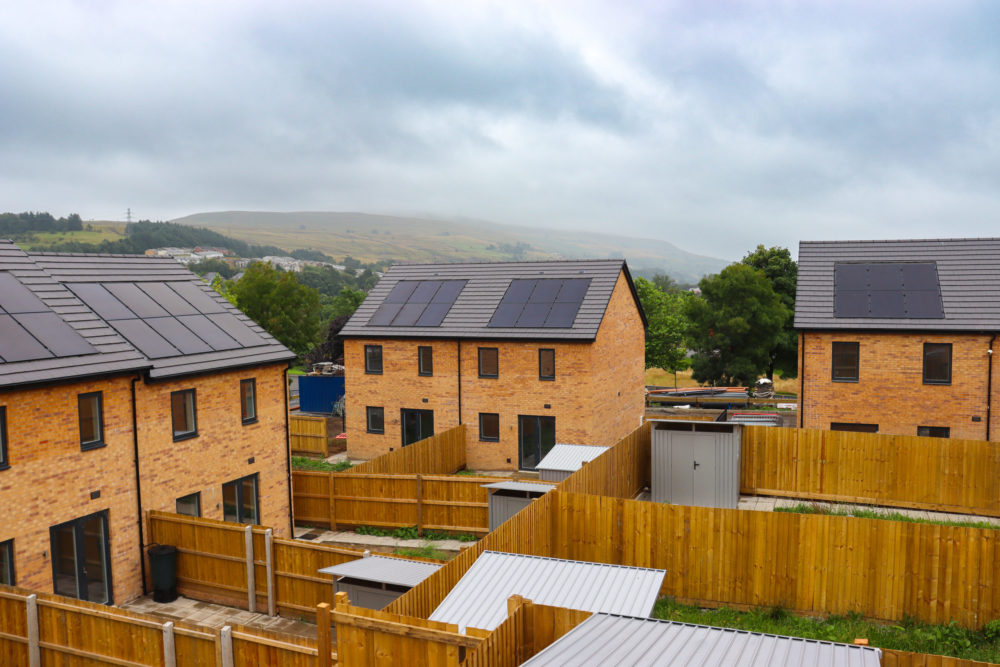Annual house price growth slows but rents climb at near-record rate

Annual house price growth has slowed, but private rents continue to climb at a “near-record rate”, according to an Office for National Statistics (ONS) report.
Across the UK, property values increased by an estimated 2.2% in the 12 months to July to reach £290,000 on average, slowing from a 2.7% increase in the 12 months to June.
Average house prices increased in Wales to £218,000 (2.0%), in England to £306,000 (1.6% annual growth),, and in Scotland to £199,000 (6.0%), in July.
In Northern Ireland, the average house price was £185,000 between April and June 2024, which was 6.4% higher than a year earlier.
The North East was the English region with the highest house price inflation in the 12 months to July, at 3.8%.
At the other end of the spectrum, house prices fell by 0.4% annually in London in July.
Record rate
ONS head of housing market indices Aimee North said: “Annual house price growth slowed this month. The North East saw the highest annual growth while London was the only region to show annual price falls.
“Rental prices continue to climb at a near-record rate, although the pace of the increase has slowed slightly. London again saw the fastest growth in rents, with the slowest rise in the south west of England (6.4%).”
The ONS said that in August 2024, the average private rent across Britain was £1,286 per month, an increase of £100 or 8.4% compared with 12 months earlier.
In London, rents rose by 9.6% annually in August, which was below a record of 11.2% in March 2024.
The report was released as separate ONS figures on Wednesday showed that UK inflation remained unchanged at 2.2% last month, marking the second month in a row that it has remained above its target 2% level.
Experts have said the figures reinforce expectations that the Bank of England will hold the base rate at 5% on Thursday.
Many mortgage rates have been edging down in recent weeks.
Richard Harrison, head of mortgages at Atom bank, said: “While another (Bank of England) base rate cut this week looks unlikely, the markets seem to expect another cut before the end of the year, spelling more good news for potential buyers.”
Sarah Coles, head of personal finance, Hargreaves Lansdown, said: “Mortgage borrowers on tracker rates are highly likely to have to wait a while longer for the next cut in their monthly payments, and while there are still cuts priced in for 2024, they may well be wondering whether higher core inflation risks throwing more cuts into question in the coming months.
“It demonstrates just how much uncertainty is involved when you peg your biggest monthly cost to a variable rate. For those looking for a new fixed rate, or with a remortgage looming, there’s better news, because mortgage rates have been on their way down.”
Mark Harris, chief executive of mortgage broker SPF Private Clients, said: “Mortgage rates continue to soften, with Santander introducing a sub-4% two-year fix on the back of the lowest two-year swap rates (which lenders use to price mortgages) in two years.
“There are also plenty of five-year fixes at sub-4% for those looking for certainty over a longer period.
“While rock-bottom rates have long gone, these reductions are giving borrowers some comfort after a prolonged period of rising rates. Competition between lenders is likely to mean further gentle reductions in mortgage rates as they vie for new business.”
David Hollingworth, associate director at L&C Mortgages, said: “The level of competition between lenders remains intense and they’ve continued to reprice regularly to try and keep up with peers.
“That will help to keep rate improvements coming for mortgage borrowers, as the focus shifts to the base rate decision tomorrow.”
Nicky Stevenson, managing director at estate agent group Fine & Country, said: “Broader economic indicators paint a mixed picture. Growth is stagnant, inflation is steady, and potential tax changes loom. However, the housing market remains robust, and recent mortgage rate cuts hint at a positive shift ahead.”
Nathan Emerson chief executive at property professionals’ body Propertymark, said: “Landlords have faced a complex combination of high inflation, interest rates, maintenance costs and a more demanding taxation structure over the last few years.”
Gareth Atkins, managing director of lettings at Foxtons, said: “July and August were the busiest months this year, as you’d expect, with August seeing a remarkable 23% month-on-month increase in renters per new instruction.
“As we approach the fourth quarter, which is usually a quieter period, landlords should make the most of this month’s market activity to secure quality tenants.
“This month goes remarkably fast, and strategic marketing now could make a significant difference over the next year.”
Support our Nation today
For the price of a cup of coffee a month you can help us create an independent, not-for-profit, national news service for the people of Wales, by the people of Wales.







Rent prices will continue to climb due to all the anti-landlord legislation (including excessive pro-tenant legislation) and tax changes. If one wishes to rent then one needs to be kinder to landlords so they actually keep houses / flats for rental purposes rather than selling them up as they are doing now.